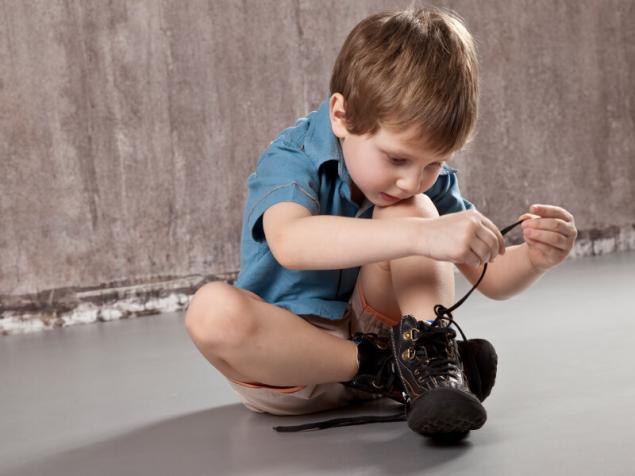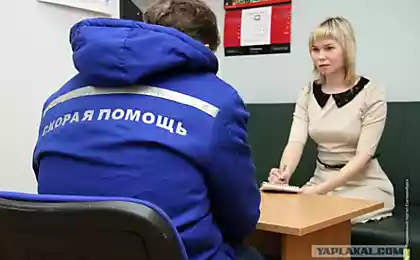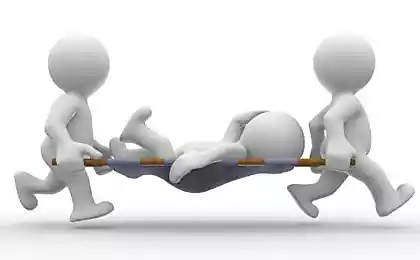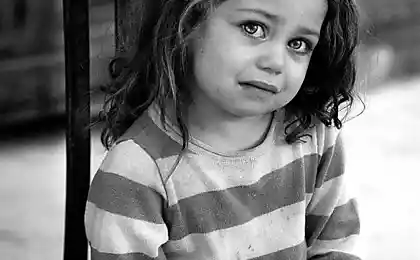442
First aid in case of learned helplessness
"I — river", leaving the Hedgehog and froze with fear. "Let the river itself carries me," a little later he decided. And it was carried downstream...
Learned helplessness — when it is active, attempts to achieve results, the person obviously prefers a passive position. Simply put, it is the desire to hide in the shell and then to see that things have changed for the better.
A "learned" it because this type of reaction occurs and is fixed in certain situations, such as when the subject is many times not something to achieve, and simply abandoned the attempt.
What is it relates to children, training, education?

I will not!
– I will not teach letters! the little girl furiously rips it from the wall carefully painted by the grandfather of the poster – I don't need them!
It so happens that the child refuses all attempts to start to do something only because the amount of work and complexity appear to him to be exorbitant. The girl sees on the wall the alphabet there are 33 letters, and knows that now she will read them all in a row, and then ask you all too, and when the letters run out, parents will shake their head and say, "Well, here again you only A and On remember!"
Learning something new, it is better to move small steps. This applies not only to students, but also domestic skills. And most importantly – the child needs to feel progress, to know that he has something. And for this you need to learn to notice even small successes. From lines one letter is smooth – excellent! Your child eats all the potatoes from the soup? Well done – excellent in search of potatoes! Receiving positive reinforcement, feeling that parents are pleased with his progress, the child feels a desire to move on.
Don't know how!
– Sonny, tie your shoelaces!
– I don't know... and the baby continues to sit on the chair, legs dangling, waiting for mom coming to help.
"Don't interrupt!", "Don't touch!", "You can't!" — moms and dads often find themselves frustrated attempts of their children to engage in some grown-up stuff. But how does a child learn what he's capable of if he had not tried? According to the parents the child learns that it's small and can not do anything, and if so... then it's not worth trying!
"Inability" in everyday situations, usually occurs due to non-involvement of the baby into adulthood. It is clear that the adult is easier and faster to chop the salad yourself. It is clear that the child would tie a shoelace several times longer.But does it make sense to hurry? Because this time will not be wasted – it will go to the child's education, skill development, formation of active life position, in the end! Just enough to start getting dressed early to give the child more time and not to rush him, allowing himself to do everything in his power.

Don't want to!
– Don't want to eat it! It is strange! – says a child for the first time faced with the casserole.
– But it's all in how you love: cabbage, chicken, cheese... just all together.
I don't want!
Very often the child to stand before the face of the new situation, afraid to start something to do, because it suggests that you will not be able to "exit the game" when you first will. What if the pudding is tasteless, but it will have to finish it?
Here parents comes to the aid of the method of "contract"that will give the child the opportunity to control the situation. For example, in the case of a new dish enough to agree that if eating one spoon, he doesn't want to finish it to the end, no claims to be, and the plate would move. Let him guarantee that, taking the first step, he always has the right to withdraw and owe nothing to anybody. Of course, the terms "contract" parents have to strictly abide. Often, when adults begin to apply this method, children first "test the strength" a "contract," specifically refusing anything (even if it is like) — there will have to be patient.
Can not!
– Son, DIY beautiful greeting card to her grandmother!
– Nah... I can't... the little boy answers, looking at placed on the shelf with their mother "joint" masterpieces in the technique of quilling.
Lack of confidence in their own abilities begins in the child when he often faces a task that he himself, at all desire, can not handle.
In a classic psychological experiment, students were offered the first "bad" tasks that were impossible to resolve, followed by common tasks, similar to those the students solved previously in the classroom. Many students, desperate to find the answer in the work on "hopeless" task failed with the usual tasks. That is quite a few times to clearly understand their helplessness in a situation in order to make it the norm of his behavior. To make a card for grandma, enough pencils and paper. Of course, the postcard in an unusual technique looks more original, but to raise the bar not necessarily.
If a child shows interest in the task, while objectively unbearable for him, of course, is to give it a try and positively assess the stage, that he was able to perform. For example, he was able to record a task, although not solved the problem until the end, or in the case of our card, he can prepare materials, created a sketch, picked the color, but could not have managed without the help to implement his idea.
Also interesting: Julia simultaneously: Allow children to achieve all itself
A new perspective on SCREENWRITING MESSAGE from parent to child
Overall, all these ways of dealing with learned helplessness is a basic rules for creating a friendly atmosphere of communication with the child. Most importantly, learn to recognize these moments and to understand the cause of children's responses. All children need the help of loving and caring people who understand their fears, not detrimental to their aspirations and willing with great patience to help them become self-reliant and enterprising people. published
Sergei Parkhomenko, the author of "Gang of girls"
P. S. And remember, just changing your mind — together we change the world! ©
Source: vk.com/diary_moms?w=wall-62510357_476883
Learned helplessness — when it is active, attempts to achieve results, the person obviously prefers a passive position. Simply put, it is the desire to hide in the shell and then to see that things have changed for the better.
A "learned" it because this type of reaction occurs and is fixed in certain situations, such as when the subject is many times not something to achieve, and simply abandoned the attempt.
What is it relates to children, training, education?

I will not!
– I will not teach letters! the little girl furiously rips it from the wall carefully painted by the grandfather of the poster – I don't need them!
It so happens that the child refuses all attempts to start to do something only because the amount of work and complexity appear to him to be exorbitant. The girl sees on the wall the alphabet there are 33 letters, and knows that now she will read them all in a row, and then ask you all too, and when the letters run out, parents will shake their head and say, "Well, here again you only A and On remember!"
Learning something new, it is better to move small steps. This applies not only to students, but also domestic skills. And most importantly – the child needs to feel progress, to know that he has something. And for this you need to learn to notice even small successes. From lines one letter is smooth – excellent! Your child eats all the potatoes from the soup? Well done – excellent in search of potatoes! Receiving positive reinforcement, feeling that parents are pleased with his progress, the child feels a desire to move on.
Don't know how!
– Sonny, tie your shoelaces!
– I don't know... and the baby continues to sit on the chair, legs dangling, waiting for mom coming to help.
"Don't interrupt!", "Don't touch!", "You can't!" — moms and dads often find themselves frustrated attempts of their children to engage in some grown-up stuff. But how does a child learn what he's capable of if he had not tried? According to the parents the child learns that it's small and can not do anything, and if so... then it's not worth trying!
"Inability" in everyday situations, usually occurs due to non-involvement of the baby into adulthood. It is clear that the adult is easier and faster to chop the salad yourself. It is clear that the child would tie a shoelace several times longer.But does it make sense to hurry? Because this time will not be wasted – it will go to the child's education, skill development, formation of active life position, in the end! Just enough to start getting dressed early to give the child more time and not to rush him, allowing himself to do everything in his power.

Don't want to!
– Don't want to eat it! It is strange! – says a child for the first time faced with the casserole.
– But it's all in how you love: cabbage, chicken, cheese... just all together.
I don't want!
Very often the child to stand before the face of the new situation, afraid to start something to do, because it suggests that you will not be able to "exit the game" when you first will. What if the pudding is tasteless, but it will have to finish it?
Here parents comes to the aid of the method of "contract"that will give the child the opportunity to control the situation. For example, in the case of a new dish enough to agree that if eating one spoon, he doesn't want to finish it to the end, no claims to be, and the plate would move. Let him guarantee that, taking the first step, he always has the right to withdraw and owe nothing to anybody. Of course, the terms "contract" parents have to strictly abide. Often, when adults begin to apply this method, children first "test the strength" a "contract," specifically refusing anything (even if it is like) — there will have to be patient.
Can not!
– Son, DIY beautiful greeting card to her grandmother!
– Nah... I can't... the little boy answers, looking at placed on the shelf with their mother "joint" masterpieces in the technique of quilling.
Lack of confidence in their own abilities begins in the child when he often faces a task that he himself, at all desire, can not handle.
In a classic psychological experiment, students were offered the first "bad" tasks that were impossible to resolve, followed by common tasks, similar to those the students solved previously in the classroom. Many students, desperate to find the answer in the work on "hopeless" task failed with the usual tasks. That is quite a few times to clearly understand their helplessness in a situation in order to make it the norm of his behavior. To make a card for grandma, enough pencils and paper. Of course, the postcard in an unusual technique looks more original, but to raise the bar not necessarily.
If a child shows interest in the task, while objectively unbearable for him, of course, is to give it a try and positively assess the stage, that he was able to perform. For example, he was able to record a task, although not solved the problem until the end, or in the case of our card, he can prepare materials, created a sketch, picked the color, but could not have managed without the help to implement his idea.
Also interesting: Julia simultaneously: Allow children to achieve all itself
A new perspective on SCREENWRITING MESSAGE from parent to child
Overall, all these ways of dealing with learned helplessness is a basic rules for creating a friendly atmosphere of communication with the child. Most importantly, learn to recognize these moments and to understand the cause of children's responses. All children need the help of loving and caring people who understand their fears, not detrimental to their aspirations and willing with great patience to help them become self-reliant and enterprising people. published
Sergei Parkhomenko, the author of "Gang of girls"
P. S. And remember, just changing your mind — together we change the world! ©
Source: vk.com/diary_moms?w=wall-62510357_476883
Dubai plans to build concentrated solar power to 1,000 MW by 2030
How to make soil fertile — simple tips























